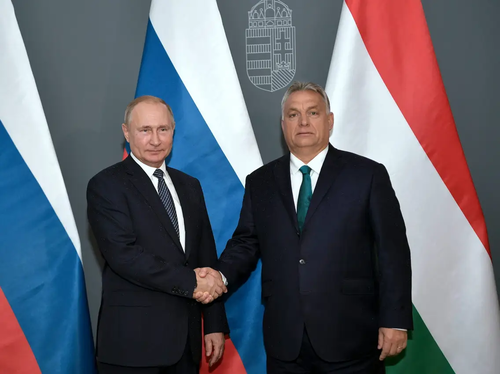
Authored by Tsvetana Paraskova via OilPrice.com,
As Hungary threatens to veto a European Union-wide ban on Russian energy products, the bloc is now considering exemptions for Hungary and Slovakia, or a longer timeframe for the two countries to reduce their heavy reliance on Russia.
Slovakia and Hungary have been among those EU members staunchly opposed to a ban on Russian oil due to their very high dependence on Russian imports. On Monday, a senior Hungarian government official said that Hungary could be ready to veto an EU embargo on Russian oil imports, Bloomberg reported.

Hungarian Cabinet Minister Gergely Gulyas told HirTV on Sunday that an EU-wide ban would require unanimity, and as such, “it makes no sense for the commission to propose sanctions affecting natural gas and crude oil that would restrict Hungarian procurements”.
“We’ve made it clear that we’ll never support,” Gulyas added.
An exemption or an extended period for Hungary – or Slovakia – could help overcome resistance, however.
The European Commission is currently discussing the sixth package of sanctions against Russia, and those sanctions are increasingly likely to include an embargo on Russian oil imports that would start by the end of this year. Slovakia and Hungary could be given exemptions or more time to find alternative supply, EU officials told Reuters on Monday, as the EU seeks a united front in sanctions against Russia.
Since the start of the Russian war in Ukraine, the EU has been split on a ban on Russian energy imports. The biggest European economy—Germany—has resisted an immediate oil embargo, saying an oil ban would plunge Germany, and Europe, into a deep recession. While Germany, Hungary, and Austria, as well as some other EU members, have opposed an immediate outright ban on Russian oil, Germany signaled last month that it could end its dependence on Russian oil and stop importing Moscow’s oil entirely by the end of this year. Germany has now reportedly dropped its opposition to a ban, if given time to procure alternatives.
Last week, German Economy Minister Robert Habeck said that a full embargo is now “manageable” for Germany and that the country hoped to find a replacement for Russian oil within days. According to Habeck, Germany is now “very, very close” to making a full Russian oil embargo a reality.
The shift in Germany’s position on a Russian oil embargo could encourage other still hesitant EU members to support a ban on Russian oil imports, analysts have said.
The EU energy ministers are meeting for emergency talks on Monday after Russia cut off natural gas supply to Poland and Bulgaria last week. Russia’s demand for ruble payments for gas and a united response to the move will top the agenda, but ministers are expected to discuss an oil embargo, too.
Authored by Tsvetana Paraskova via OilPrice.com,
As Hungary threatens to veto a European Union-wide ban on Russian energy products, the bloc is now considering exemptions for Hungary and Slovakia, or a longer timeframe for the two countries to reduce their heavy reliance on Russia.
Slovakia and Hungary have been among those EU members staunchly opposed to a ban on Russian oil due to their very high dependence on Russian imports. On Monday, a senior Hungarian government official said that Hungary could be ready to veto an EU embargo on Russian oil imports, Bloomberg reported.

Hungarian Cabinet Minister Gergely Gulyas told HirTV on Sunday that an EU-wide ban would require unanimity, and as such, “it makes no sense for the commission to propose sanctions affecting natural gas and crude oil that would restrict Hungarian procurements”.
“We’ve made it clear that we’ll never support,” Gulyas added.
An exemption or an extended period for Hungary – or Slovakia – could help overcome resistance, however.
The European Commission is currently discussing the sixth package of sanctions against Russia, and those sanctions are increasingly likely to include an embargo on Russian oil imports that would start by the end of this year. Slovakia and Hungary could be given exemptions or more time to find alternative supply, EU officials told Reuters on Monday, as the EU seeks a united front in sanctions against Russia.
Since the start of the Russian war in Ukraine, the EU has been split on a ban on Russian energy imports. The biggest European economy—Germany—has resisted an immediate oil embargo, saying an oil ban would plunge Germany, and Europe, into a deep recession. While Germany, Hungary, and Austria, as well as some other EU members, have opposed an immediate outright ban on Russian oil, Germany signaled last month that it could end its dependence on Russian oil and stop importing Moscow’s oil entirely by the end of this year. Germany has now reportedly dropped its opposition to a ban, if given time to procure alternatives.
Last week, German Economy Minister Robert Habeck said that a full embargo is now “manageable” for Germany and that the country hoped to find a replacement for Russian oil within days. According to Habeck, Germany is now “very, very close” to making a full Russian oil embargo a reality.
The shift in Germany’s position on a Russian oil embargo could encourage other still hesitant EU members to support a ban on Russian oil imports, analysts have said.
The EU energy ministers are meeting for emergency talks on Monday after Russia cut off natural gas supply to Poland and Bulgaria last week. Russia’s demand for ruble payments for gas and a united response to the move will top the agenda, but ministers are expected to discuss an oil embargo, too.







